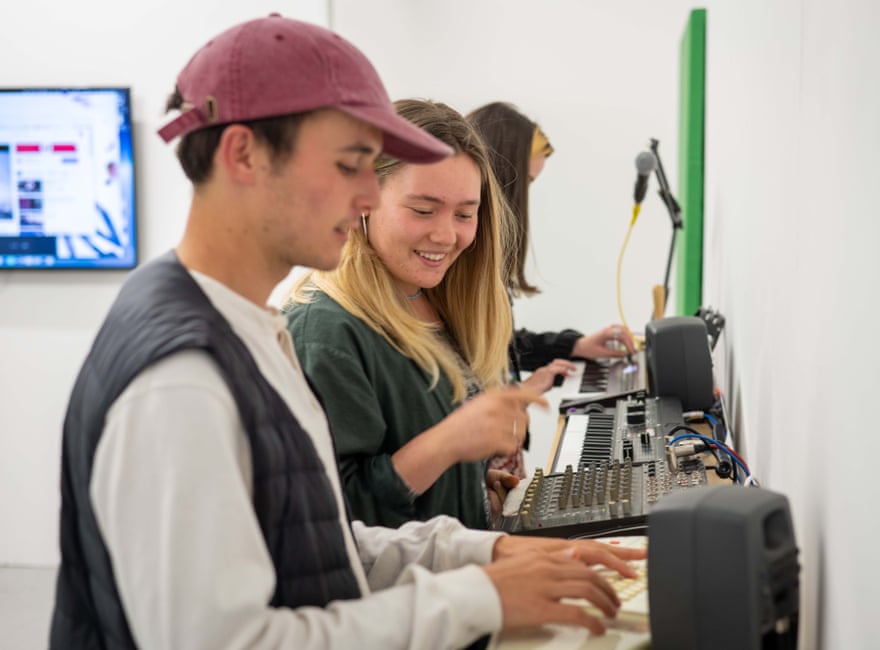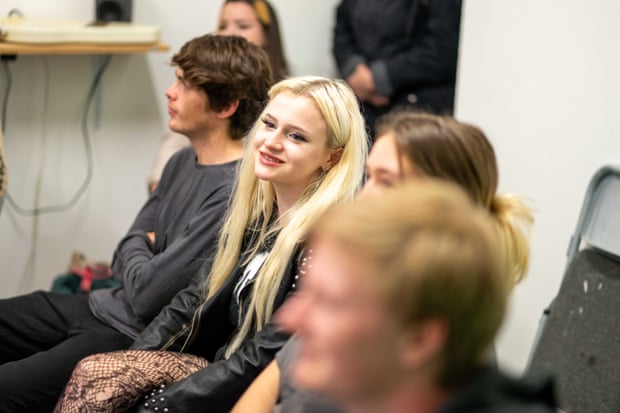It’s a bright summer Saturday in the old Cornish mining town of Redruth. White clouds are scudding picturesquely over Carn Brea, the hilltop monument that looms above town, but Liam Jolly has no time to admire the view.
“It’s manic!” says the artist, as he ducks into the darkness of Auction House, his tiny, ramshackle gallery just off the high street. Inside, it’s humming with activity. Amplifiers and mixing desks are stacked along the walls. Gallerygoers in headphones are bobbing their heads. Projections dance across the walls, showing distorted fractals, psychedelic Cornish landscapes and street signs that have taken on animated lives of their own. Ambient bleeps and drones drift on to the street, causing shoppers to stop. Bemused, they peer inside to determine the source of the noise.
“It’s not the kind of thing you usually see in Redruth on a Saturday,” Jolly laughs. “Most people are just out shopping. But this is such an exciting thing for the town, especially for young artists who are showing their work for the first time. And it’s all thanks to Mark. Without him, this never would have come together.”
The Mark is Mark Leckey, the Turner prize-winning artist best known for his video work, from 1999’s Fiorucci Made Me Hardcore to O’ Magic Power of Bleakness, at Tate Britain 20 years later. Throughout June, Leckey has been working with 10 young people attending his Music & Video Lab, a month-long programme developed in partnership with Auction House and the west Cornwall arts organisation Cast, financed by £15,000 from Arts Council England.

It’s the realisation of a long-held ambition for Leckey: establishing his own art school, one that offers opportunities to young people locked out of mainstream institutions by unaffordable living costs and sky-high tuition fees. “If you’re not from a middle-class background,” he says, “art school is still seen as something that’s beyond you. I came out of art school thinking I wasn’t equipped intellectually to be an artist. I felt like I was lacking knowledge, intellectual reasoning – just lacking. I’m not entirely sure I’m over it now. I’ve always thought there must be other ways of learning how to be an artist than art school. That’s what the Lab is about.”
After an open callout, the students were selected from locations around Cornwall, with a focus on “young people who wouldn’t normally even consider the idea of art school”. Throughout June, they worked three days a week alongside Leckey, Jolly and producer Stuart Blackmore, experimenting with video software and editing tools to create work, with guest lectures by artists including Gazelle Twin, Lee Gamble and Patten.
“We deliberately didn’t mention art,” says Leckey. “We talked about it being a music and video course. The biggest barrier to creativity is feeling that it’s not for you. We were trying to bypass criticality and encourage them to be as free in making as they could be.”

That the project happened in Redruth carries extra significance. Once one of Cornwall’s richest towns, thanks to the mining boom of the 18th and 19th centuries, the Redruth area is now one of the county’s most deprived, a world away from the sanitised vision of Cornwall perpetuated by fluffy TV shows and glossy property brochures.
“Visually and symbolically, it felt the right place to do it,” says Teresa Gleadowe, Cast’s chair and a driving force behind the project. “Young people in Cornwall are quite isolated, but Redruth is a good gathering place. Part of it was simply bringing them into a space together, and letting artists like Mark and Liam take the lead. For me, the project’s strength is that Mark doesn’t come across like a teacher: he’s just someone talking about why he makes work, what it’s for, how it makes you feel. That’s very inspiring.”
The Lab’s success has inspired the team to ponder future plans, perhaps further workshops in London, Manchester or Liverpool. Leckey will also showcase music from the Lab on his weekly radio show on NTS. “I was hoping for something incredible and new,” says Leckey. “That was the dream. And it’s absolutely fulfilled that. I’d love to do it again.”
For the students, it’s been a life-changing process. Among them is Kittie Smith, a 21-year-old singer-songwriter from Helston. Having dropped out of a music degree in Brighton owing to spiralling costs and the demands of caring for three young children, she has been able to reconnect with her songwriting and rediscover the confidence to perform.
“Working with Mark and Liam,” says Smith, “has given me the freedom to be who I am without the fear of someone telling me that I wasn’t good enough, which was what I constantly heard at music school. Everyone supported each other: we were all just Cornish kids who wanted to do something creative. That’s what the education system misses out on. Creativity can’t be graded, it’s all subjective. No one can create what you create.”
Stay connected with us on social media platform for instant update click here to join our Twitter, & Facebook
We are now on Telegram. Click here to join our channel (@TechiUpdate) and stay updated with the latest Technology headlines.
For all the latest Education News Click Here
